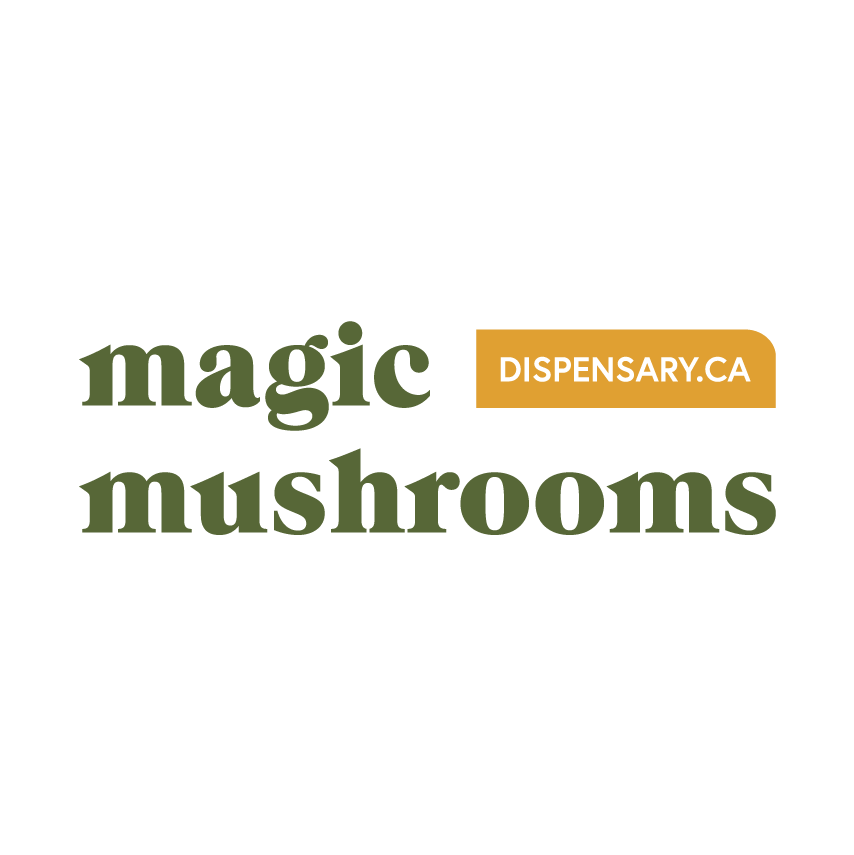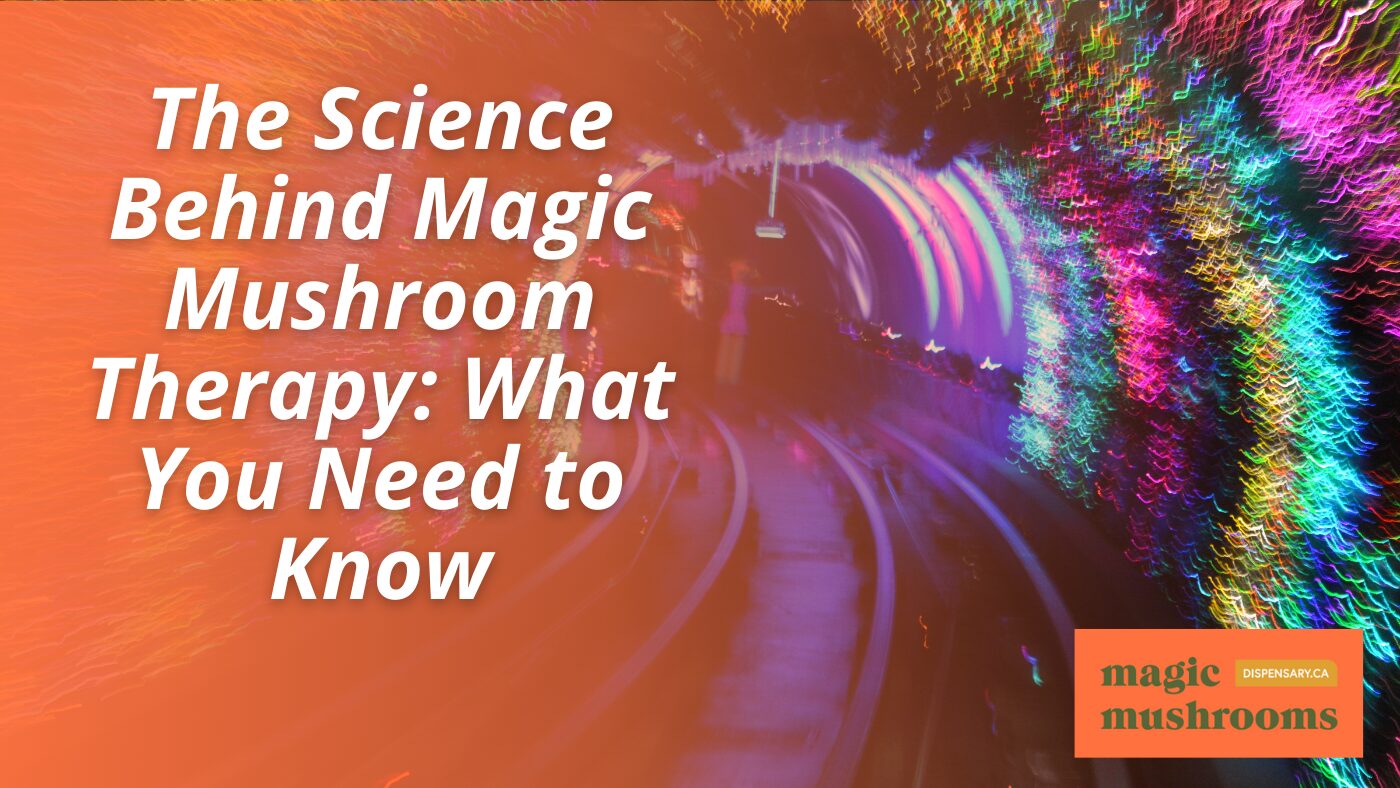Psychotherapy involving magic mushrooms utilizes psilocybin, a hallucinogenic substance present in specific types of mushrooms, to address a variety of mental health issues. This form of therapy affects the brain’s serotonin receptors, greatly altering mood, perception, and thinking processes. Research has shown that psilocybin enhances neural connectivity and adaptability, yielding substantial advantages for the treatment of disorders like depression and anxiety. Its safety and efficacy have been proven in clinical trials, showing sustained mental health benefits when used in regulated settings. As laws around the world change, the availability of psilocybin therapy is increasing, indicating a broad potential for its future role in mental health care. The understanding of this rapidly advancing area continues to deepen.
Key Takeaways
– Psilocybin, found in magic mushrooms, interacts with serotonin receptors, influencing mood, perception, and cognition.
– Clinical trials show psilocybin therapy effectively treats depression, anxiety, and other disorders, with effects lasting months.
– Therapy involves controlled dosages in a medically supervised setting, ensuring safety and maximizing therapeutic benefits.
– Psilocybin increases brain connectivity and plasticity, potentially leading to long-term improvements in mental health.
– The treatment setting and patient mindset (set and setting) are crucial for a positive therapeutic outcome.
Understanding Magic Mushroom Therapy
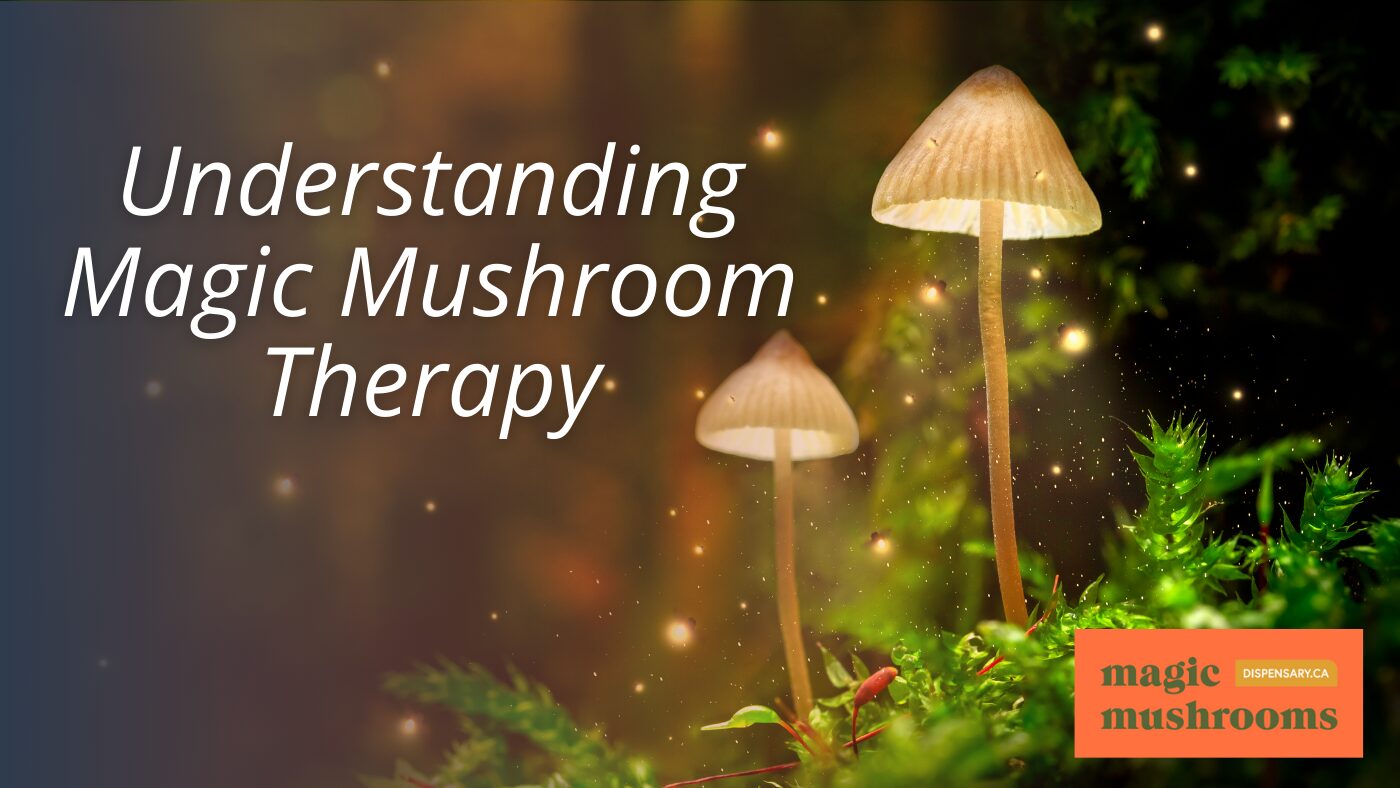
Magic mushroom therapy leverages the psychoactive compound psilocybin, found in certain fungi, to address various mental health disorders effectively. Once ingested, psilocybin is converted into psilocin, which interacts with serotonin receptors in the brain. This interaction induces a range of psychological effects, which are central to the therapeutic benefits of the treatment. Research indicates that this therapy can precipitate rapid and substantial antidepressant effects, with improvements in mood and outlook persisting for six to twelve months in many cases.
Clinical studies have demonstrated the potential of magic mushroom therapy in treating not only depression but also anxiety, obsessive-compulsive disorder (OCD), and substance use disorders. The mechanism involves psilocybin’s ability to increase neural connectivity and plasticity. This means that the brain can form new connections and pathways, which might help break the cycles of negative thinking and behavior associated with these conditions.
However, the efficacy of this therapy is heavily dependent on the environment in which it is administered. The controlled environment ensures that individuals receive the appropriate dosage and psychological support, minimizing risks and enhancing the therapeutic outcomes. This supervised setting is critical as it helps manage the intense experiences that patients might encounter during the session, providing a safe space for them to explore and resolve deeper psychological issues.
Magic mushroom therapy represents a promising advancement in mental health treatment, combining ancient natural remedies with modern clinical practices to offer new hope for individuals battling chronic mental health conditions.
History of Magic Mushroom Therapy
Building on its modern clinical applications, the foundations of magic mushroom therapy trace back to ancient times when indigenous cultures utilized psilocybin-containing mushrooms in their spiritual and medicinal rituals. These ancient practices were not merely for healing physical ailments but also for profound spiritual enlightenment and community bonding. In particular, Mesoamerican societies, such as the Aztecs and Mazatecs, held these fungi in high regard, calling them ‘teonanácatl,’ which translates to ‘flesh of the gods.’ This deep-rooted cultural and religious significance reflects the profound impact and reverence these communities had for psychedelic experiences induced by psilocybin.
The modern rediscovery of the potential of psilocybin began notably in the 1950s when Albert Hofmann, a Swiss chemist who also discovered LSD, successfully isolated and synthesized psilocybin from the Psilocybe mushrooms. This breakthrough paved the way for the first wave of scientific research into the therapeutic properties of psilocybin during the 1960s. Researchers and psychologists explored its use for treating various psychological disorders, including depression, anxiety, and addiction, marking the birth of what we now refer to as psychedelic-assisted psychotherapy.
However, the political and cultural shifts of the 1970s led to stringent regulations and the classification of psilocybin as a Schedule I drug, significantly stymying further research into its therapeutic potential. It wasn’t until the 21st century that a resurgence in interest, driven by more progressive attitudes towards psychoactive substances and compelling clinical results, reignited the exploration of psilocybin as a viable therapeutic tool. Today, over 130 active clinical trials are investigating its efficacy, signaling a renewed recognition of its potential to address various mental health challenges.
Current Legal Status Worldwide
The global legal status of psilocybin, the psychoactive component in magic mushrooms, varies greatly across different countries, reflecting diverse cultural, medical, and legal perspectives. In the United States, psilocybin is classified as a Schedule I substance, which categorizes it as having a high potential for abuse and no accepted medical use, making its possession, use, or distribution illegal under federal law. However, recent legislative changes in states such as Colorado and Oregon have challenged this status, allowing for its use in controlled therapeutic settings.
In contrast, the Netherlands presents a more lenient framework, where magic mushrooms themselves have faced restrictions, but truffles containing psilocybin remain legally available. Similarly, Portugal has decriminalized the possession of small amounts of psilocybin, focusing instead on treatment and harm reduction for users rather than punitive measures.
Canada also recognizes the potential medicinal benefits of psilocybin, permitting its use under certain conditions for research purposes and through exemptions for end-of-life care, reflecting a growing acknowledgment of its therapeutic potential.
These examples illustrate a shifting international landscape where the legal status of psilocybin is increasingly influenced by new research and changing public opinions about its safety and efficacy in therapeutic contexts. Therefore, the regulatory environment continues to evolve, with more countries considering reforms that could facilitate medical research and potentially change the legal status of psilocybin and related compounds in the future. This ongoing transformation underscores the complexity of integrating emerging science with existing legal frameworks.
Chemical Properties of Psilocybin
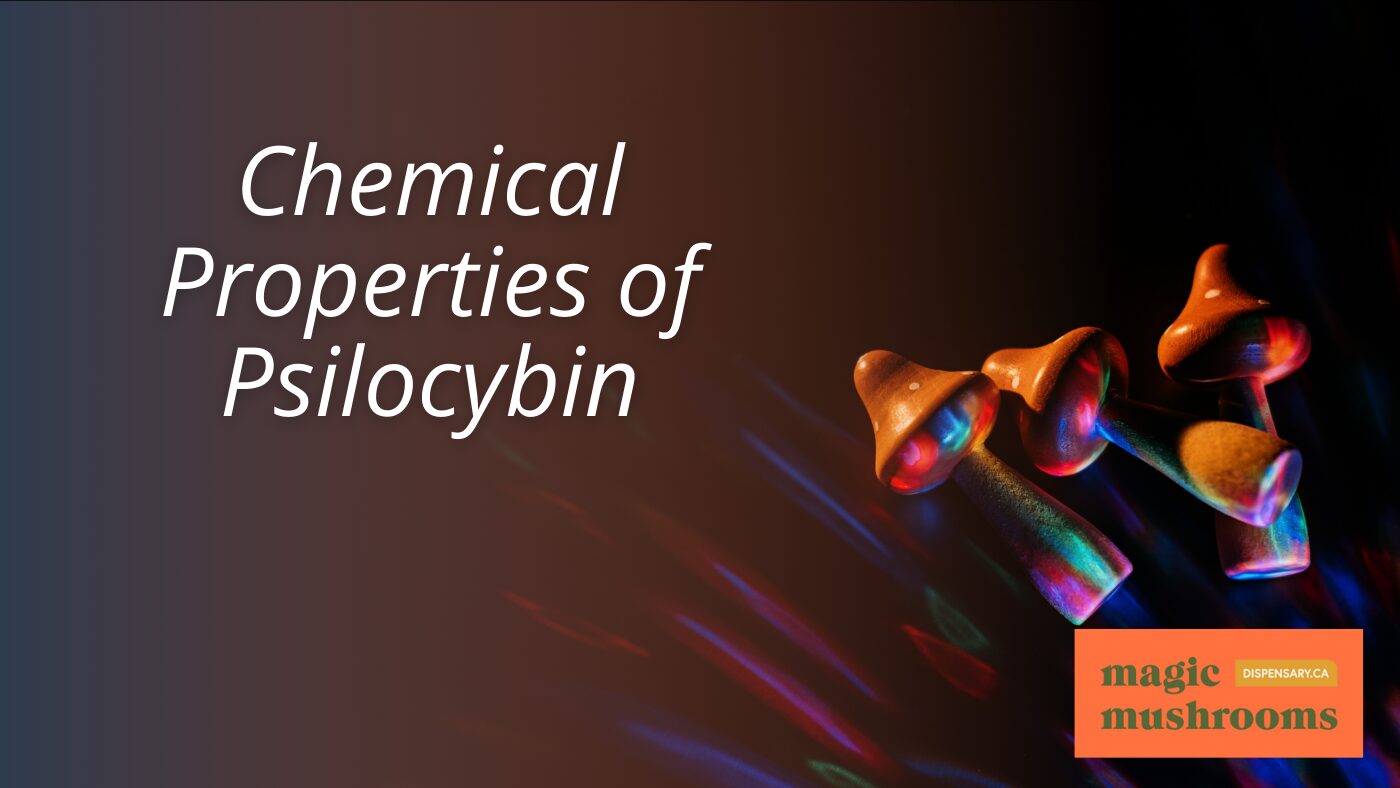
Psilocybin, a naturally occurring psychedelic compound, is found in over 200 species of mushrooms and is pivotal in psychedelic therapy due to its interaction with serotonin receptors in the brain. This compound belongs to a class of drugs known as classic serotonergic psychedelics, which also includes substances like LSD and mescaline. Chemically, psilocybin is distinguished by its tryptamine core, structurally similar to the neurotransmitter serotonin, and a phosphate group attached to its molecular structure. This configuration allows psilocybin to be soluble in water, facilitating its absorption and metabolism in the human body.
Upon ingestion, psilocybin is quickly converted by the body into psilocin, its active form, through a process known as dephosphorylation. This chemical transformation is vital for psilocybin’s psychoactive effects. Psilocin’s structure allows it to cross the blood-brain barrier efficiently, where it exerts its effects by mimicking serotonin and binding to serotonin receptors, particularly the 5-HT2A receptor subtype.
The chemical properties of psilocybin contribute significantly to its pharmacokinetics—the way the drug is absorbed, distributed, metabolized, and excreted in the body. Its relatively low molecular weight and polar nature due to the phosphate group enhance its ability to be metabolized quickly, typically leading to effects that last between four to six hours following ingestion.
Historically, the unique properties of psilocybin have been utilized in various cultural, religious, and spiritual practices to induce altered states of consciousness, illustrating its profound impact on human culture and spirituality across different civilizations and epochs.
How Psilocybin Affects the Brain
Understanding how psilocybin interacts with serotonin receptors is key to exploring its profound effects on brain function and cognition. Psilocybin, the active compound in magic mushrooms, primarily targets the serotonin 2A receptor (5-HT2A), pivotal for its psychotropic impacts. This interaction triggers a cascade of changes within the brain’s neural circuits, altering perception, mood, and cognition. Functional MRI studies have revealed that psilocybin greatly enhances connectivity between different regions of the brain. This enhanced connectivity helps explain the complex visual hallucinations and profound sensory experiences reported by users.
Moreover, psilocybin has been shown to decrease activity in the default mode network (DMN), a brain network strongly linked with self-referential thoughts and the ego. The suppression of the DMN leads to what many describe as ego dissolution, where the normal boundaries of self are broken down. This phenomenon is critical as it correlates with the intense spiritual or transformative experiences often reported during psychedelic therapy, which are thought to be central to its therapeutic effects.
The similarities between the effects of psilocybin on the brain and those achieved through deep meditation suggest that psilocybin promotes a heightened state of consciousness and introspection. This altered state may facilitate a reconfiguration of cognitive and emotional processes, potentially making it a powerful tool in treating various mental health disorders. By promoting neuroplasticity—the brain’s ability to form new neural connections—psilocybin can help disrupt entrenched patterns of thought and behavior, offering hope for lasting psychological change and growth.
Typical Dosage and Administration
Administering psilocybin in a clinical setting typically involves doses ranging from 10-25 milligrams, calibrated according to the patient’s weight and sensitivity. This vital dosing is essential for guaranteeing the safety and efficacy of the therapy, allowing healthcare professionals to tailor the experience to the individual needs of the patient. The administration of psilocybin is conducted in a controlled environment, where medical supervision is constant to promptly address any adverse reactions or psychological distress.
The duration of a psilocybin session can vary, but generally lasts between 4 to 6 hours, with the peak effects occurring within the first two hours after ingestion. During this period, patients are closely monitored by trained therapists who provide support and ensure the patient remains comfortable and safe. This monitoring continues throughout the session to manage both the psychological and physiological responses to the drug.
The frequency of these sessions is another aspect of psilocybin therapy that is adapted to individual requirements. While some patients may experience significant benefits from a single session, others might need multiple sessions to achieve the desired therapeutic outcomes. These decisions are made based on a thorough evaluation of the patient’s response to the initial treatment and their ongoing mental health needs.
The Role of Set and Setting
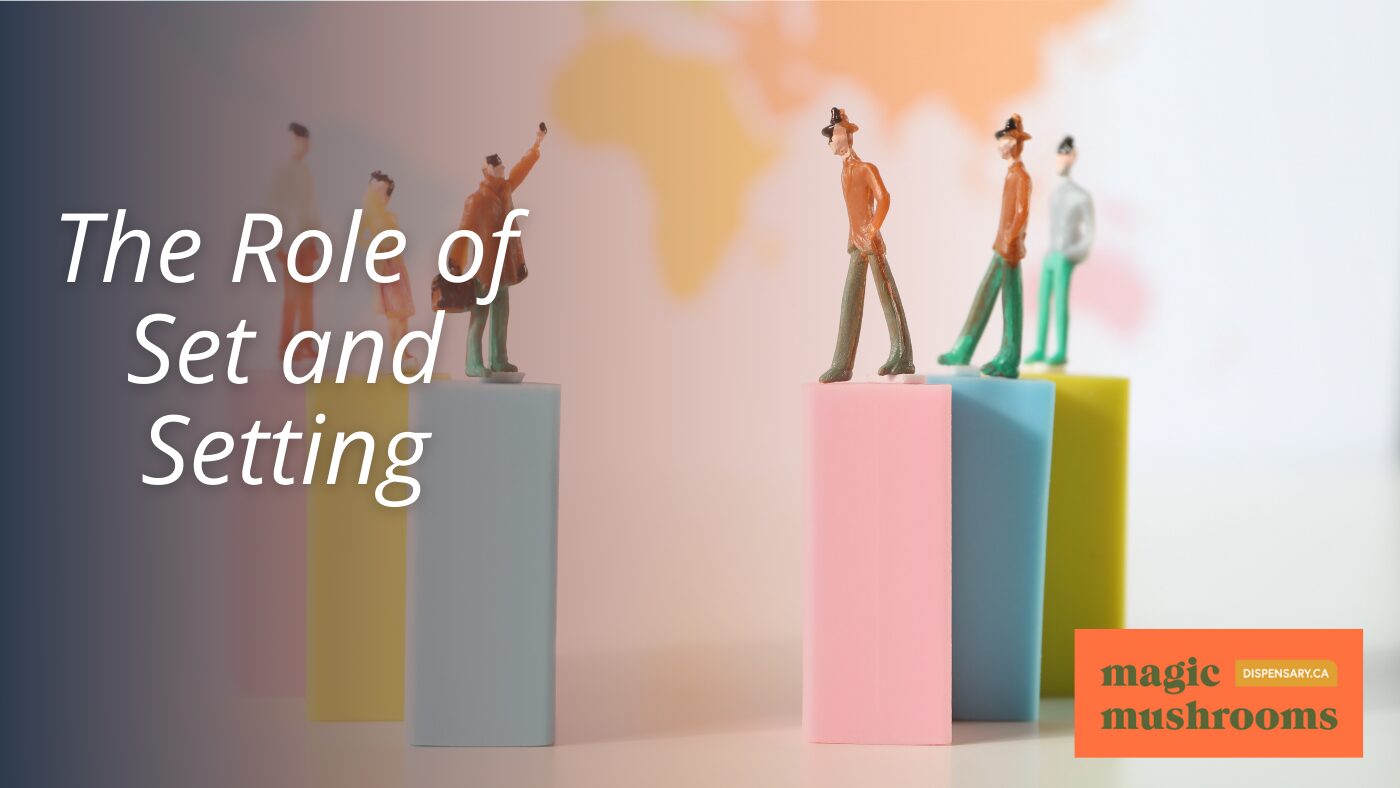
Beyond the pharmacological aspects and clinical protocols, the concept of ‘set and setting’ plays a pivotal role in optimizing the therapeutic efficacy of magic mushroom therapy. This concept emphasizes the importance of the mental state (‘set’) and the physical environment (‘setting’) in which the therapy is administered. ‘Set’ refers to the internal mindset and emotional condition of the participant before undergoing psilocybin therapy. Factors such as a person’s expectations, personality, and emotional stability are critical as they heavily influence the outcomes of the psychedelic experience. A positive, receptive mindset can immensely enhance the therapeutic effects, promoting profound insight and emotional release.
On the other hand, ‘setting’ pertains to the external environment where the therapy takes place. This includes the physical space, which should be designed to provide comfort and safety, creating a welcoming atmosphere that fosters a sense of security and trust. Elements such as ambient lighting, soothing music, and the presence of supportive, well-trained therapists contribute to a setting that can positively impact the therapeutic journey. These environmental details are not just aesthetic but are crafted to align with the psychological needs of the participant, ensuring a conducive space for emotional and cognitive exploration.
Understanding and meticulously planning both set and setting are essential for maximizing the benefits of magic mushroom therapy. They are integral to preparing the participant for a transformative experience and are considered best practices in psychedelic-assisted therapy. By controlling these variables, therapists can help mitigate risks, enhance comfort, and pave the way for more effective and meaningful therapeutic outcomes.
Overview of Clinical Studies
Clinical studies have demonstrated that magic mushroom therapy offers significant potential in treating various mental health disorders, including depression, anxiety, and PTSD. Research has highlighted the ability of psilocybin, the active compound in magic mushrooms, to provide rapid and long-lasting relief from symptoms. In controlled clinical settings, patients have reported significant improvements in mood and behavior, often lasting several months following a single treatment session.
The safety and efficacy of magic mushroom therapy have been confirmed through rigorous testing. Studies consistently show that when administered in a controlled environment with professional supervision, the therapy is safe and can lead to substantial improvements in mental health, particularly for those with treatment-resistant conditions. This has opened new avenues for addressing severe cases that have previously shown little to no response to traditional therapies.
Moreover, ongoing research is broadening the scope of conditions potentially treatable with magic mushroom therapy. Clinical trials are exploring its use in the management of addiction, existential anxiety related to terminal illness, and even cluster headaches, demonstrating its diverse therapeutic potential. Each study contributes to a deeper understanding of how psilocybin works in the brain, which helps in optimizing treatment protocols and enhancing patient outcomes.
The positive outcomes from these studies have spurred further research and interest in psychedelic-assisted therapy. As the body of evidence grows, magic mushroom therapy is increasingly being considered a valuable component in the future landscape of mental health treatment, promising a new era of effective therapies for challenging psychiatric conditions.
Psilocybin for Depression Treatment
Psilocybin therapy has emerged as a pivotal treatment, displaying rapid and enduring antidepressant effects for individuals grappling with severe depression. This innovative approach involves the administration of psilocybin, a natural psychedelic compound found in certain mushrooms, which has shown significant clinical benefits. Research indicates that the effects of a single dose can last from 6 to 12 months, providing a long-term relief option for those who have not responded to traditional treatments.
Studies have demonstrated the efficacy of psilocybin in not only alleviating symptoms of treatment-resistant depression but also in improving conditions associated with obsessive-compulsive disorder. When combined with structured talk therapy, psilocybin assists patients in achieving a greater sense of emotional and psychological well-being. This combination has been instrumental in enhancing the overall effectiveness of the treatment, highlighting the importance of an integrated therapeutic approach.
The mechanism behind psycilocybin’s impact lies in its ability to stimulate serotonin receptors in the brain, particularly in the prefrontal cortex. This stimulation leads to increased neural plasticity, allowing the brain to form new connections and pathways which are thought to underpin the improvements in mood and outlook observed in patients.
Importantly, the use of psilocybin in clinical settings is carefully regulated and conducted under professional supervision, ensuring safety and maximizing therapeutic outcomes. This controlled environment is vital for facilitating the positive effects of psilocybin while minimizing potential risks, thereby supporting its emerging role as a valuable tool in the treatment of depression.
Treating Anxiety With Psilocybin
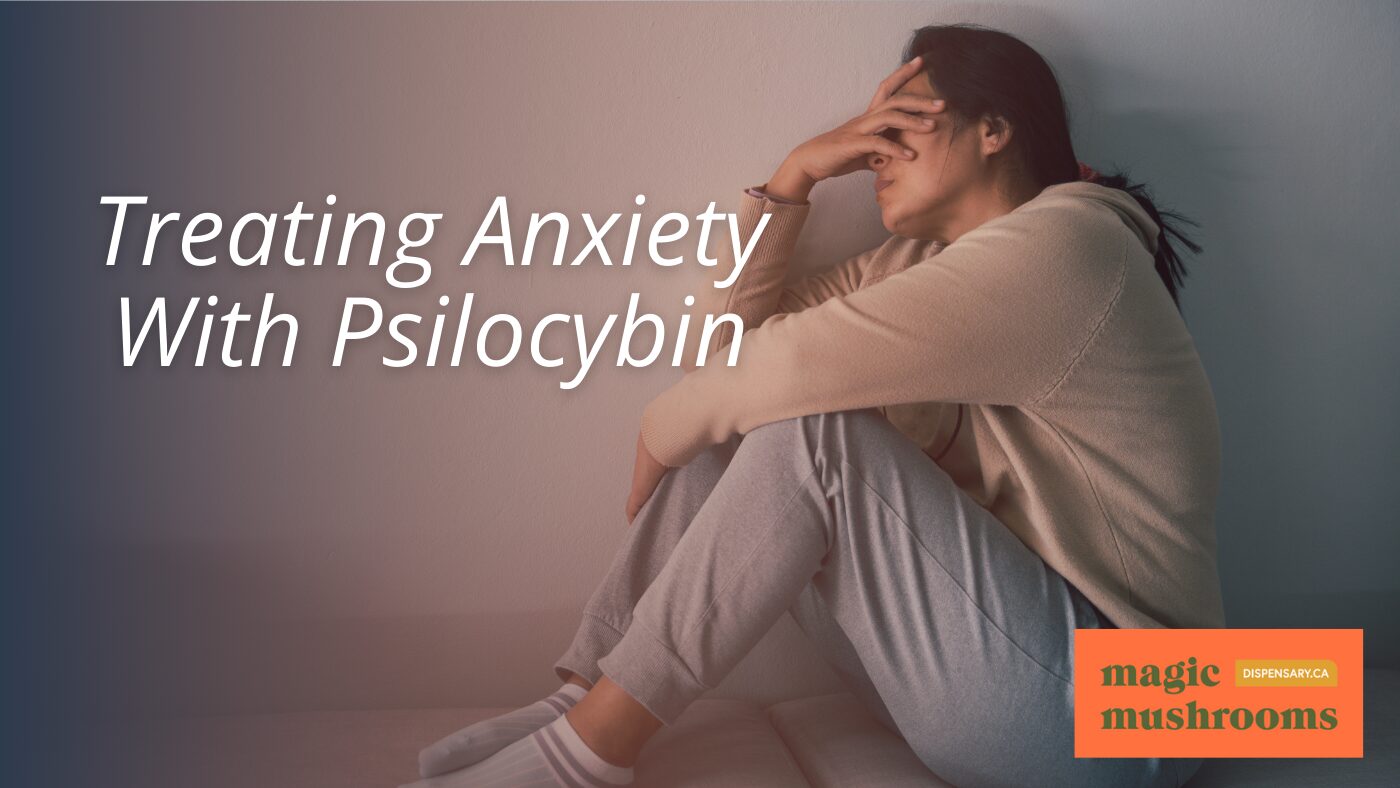
Building on its success in treating depression, psilocybin therapy also offers potential benefits for reducing anxiety, particularly in cancer patients facing existential distress. Research indicates that psilocybin, the active compound in magic mushrooms, interacts with serotonin receptors in the brain, which can lead to profound shifts in consciousness and perception. These shifts often manifest as mystical-type experiences that have been shown to greatly decrease levels of anxiety and fear of death in such patients.
Studies have documented that after a single session of psilocybin-assisted therapy, cancer patients frequently report a substantial reduction in anxiety symptoms, with effects lasting up to six months or more. This enduring impact suggests that psilocybin could catalyze a restructuring of the brain’s fear response mechanisms. It appears that psilocybin helps individuals confront and reframe their anxiety-inducing thoughts, enabling a more profound acceptance of their condition and life circumstances.
Further, the therapeutic setting in which psilocybin is administered plays an essential role in its efficacy. Sessions are typically conducted in a controlled, serene environment, guided by trained professionals who help individuals navigate their experiences. This supportive setting is crucial to fostering a safe space where patients can explore their emotions and thoughts.
Psilocybin Therapy for PTSD
Recent studies have demonstrated that therapy involving psilocybin shows potential in alleviating symptoms associated with Post-Traumatic Stress Disorder (PTSD). This promising approach leverages the psychoactive compound found in certain species of mushrooms, which facilitates profound psychological experiences and may catalyze the emotional processing of traumatic events. Patients undergoing psilocybin therapy for PTSD report reductions in core symptoms such as intrusive thoughts, avoidance behaviors, and hyperarousal.
The therapeutic process typically includes several sessions under the guidance of trained professionals. During these sessions, individuals receive a controlled dose of psilocybin and are supported as they confront and work through traumatic memories. This method allows patients to reframe their experiences and often leads to significant emotional and psychological relief. Research indicates that this treatment can decrease emotional numbing, helping individuals to reconnect with their emotions and engage more fully with their lives.
Despite its potential, psilocybin therapy for PTSD is still in experimental stages. The current findings are based on limited trials, emphasizing the need for more extensive research to validate and standardize this treatment. Furthermore, the sessions are carefully structured to support safety and efficacy, highlighting the importance of professional oversight in these therapeutic settings.
The initial success of psilocybin therapy in treating PTSD symptoms has opened new avenues for exploring alternative treatments for mental health disorders. As research progresses, this could lead to broader acceptance and integration of psilocybin-assisted therapy in clinical practices, offering hope to those for whom traditional treatments have fallen short.
Long-term Effects on Mental Health
Exploring beyond immediate therapeutic outcomes, long-term studies indicate that psilocybin therapy can sustain significant improvements in mental health for periods ranging from 6 to 12 months post-treatment. This extended impact is particularly notable in individuals suffering from conditions such as depression, anxiety, OCD, and substance use disorders. The enduring nature of these benefits suggests that psilocybin facilitates profound neural changes, enhancing emotional and cognitive flexibility.
Research highlights the transdiagnostic potential of psilocybin therapy, underlining its effectiveness across a spectrum of mental health disorders. This broad applicability is essential, considering the complex interplay of symptoms in co-morbid conditions often found in psychiatric patients. The ability of psilocybin to address multiple facets of mental health with infrequent dosing also positions it as a uniquely sustainable therapeutic option, reducing the need for continuous medication intake and thereby diminishing the risk of pharmacological dependency.
Furthermore, the rapid onset of symptom relief, often observed within hours after a single psilocybin session, evolves into long-lasting improvements. This aspect is vital for individuals seeking alternatives to traditional treatments that might not provide such swift or durable effects. The mechanism behind these lasting changes is thought to involve the enhancement of synaptic connectivity and plasticity in brain regions critical for emotion regulation and cognitive processing.
Potential Side Effects
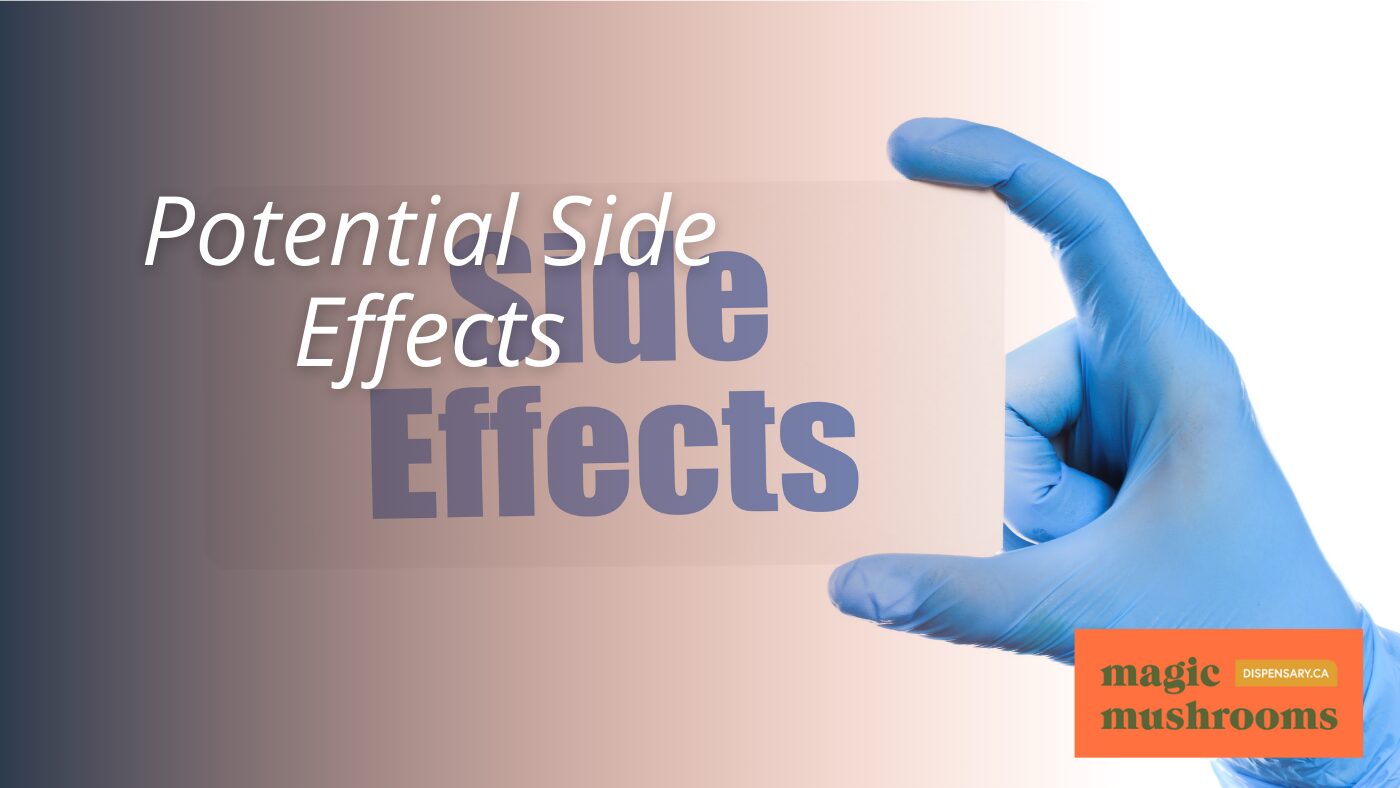
While magic mushroom therapy offers substantial therapeutic benefits, it is also associated with some potential side effects such as nausea, increased heart rate, and altered perceptions. These effects are primarily due to the interaction of psilocybin, the active compound in magic mushrooms, with serotonin receptors in the brain. This interaction can lead to an intensified sensory experience and emotional responsiveness, which, while advantageous in a therapeutic setting, can also cause discomfort and disorientation.
Additionally, some individuals may experience more severe reactions such as panic attacks, transient psychosis, or persisting perception disorder (where sensory disturbances continue long after the drug’s effects have worn off). These serious side effects are relatively rare but underscore the need for careful screening of participants, appropriate setting, and professional guidance during the therapy sessions.
The variability in individual experiences with magic mushroom therapy highlights the importance of controlled dosages and expert supervision. The set (the mental state of an individual) and setting (the physical and social environment) in which therapy is conducted play vital roles in influencing the outcomes and minimizing risks. Adhering to safety protocols is essential to mitigate potential negative reactions.
Pre-therapy screenings help identify individuals who may have a predisposition to adverse reactions, while structured follow-ups ensure that any lingering effects are appropriately managed. By maintaining stringent guidelines and a supportive therapeutic environment, the risks associated with magic mushroom therapy can be greatly reduced, making it a safer option for those seeking psychological healing.
Comparisons to Traditional Therapies
Given the potential side effects of magic mushroom therapy, it is beneficial to examine how this approach compares with traditional therapies in treating psychological disorders. Magic mushroom therapy, primarily involving the compound psilocybin, presents a significant mode of action by directly engaging serotonin receptors, which contrasts with the mechanisms of traditional selective serotonin reuptake inhibitors (SSRIs). While SSRIs typically require weeks to manifest therapeutic effects, psilocybin therapy has demonstrated the capability to induce rapid and sustained antidepressant effects within a few days, with benefits persisting for 6-12 months.
Traditional therapies often involve long-term medication regimes that might lead to dependency or side effects, which some patients find intolerable. In contrast, psilocybin offers a treatment course that may involve only a few sessions, potentially reducing the risk of long-term side effects and dependency. Additionally, the experiential aspect of psilocybin therapy—often described as a transformative psychological journey—provides a therapeutic dimension that conventional treatments typically lack. This aspect can lead to significant shifts in perspective and behavior that are essential for psychological healing.
Research has also highlighted that novel psychedelic compounds derived from magic mushrooms may hold promise for more targeted therapies, offering benefits without the hallucinogenic effects. These compounds could pave the way for broader acceptance and integration into mainstream mental health treatment protocols.
Personal Recovery Stories
Personal recovery stories from individuals who have undergone magic mushroom therapy provide compelling evidence of its potential benefits in treating mental health disorders. These firsthand accounts often detail significant improvements in conditions such as depression, anxiety, and addiction, showcasing the transformative impact that psilocybin-assisted therapy can have on mental and emotional well-being.
Patients who have participated in these therapies frequently describe experiencing profound insights and increased self-awareness during their sessions. Many report a sense of connectedness and a renewed perspective on life, which they attribute to their therapeutic experiences with psilocybin. For instance, one individual recounted overcoming years of severe depression after a series of guided sessions, noting a lasting uplift in mood and a newfound ability to engage positively with life’s challenges.
Moreover, these personal narratives highlight the long-term benefits that can arise from such interventions. Unlike traditional treatments that may require ongoing use of medications, many individuals emphasize the sustained improvements in their mental health long after the therapy has concluded. This aspect of magic mushroom therapy is particularly appealing to those seeking alternatives to conventional pharmacological approaches.
The collection of these recovery stories serves not only as a confirmation of the potential of psilocybin in mental health therapy but also as a source of hope and inspiration for others facing similar struggles. As more individuals share their positive experiences, the stigma surrounding psychedelic-assisted therapies may continue to diminish, paving the way for broader acceptance and understanding of this treatment modality.
Neuroplasticity and Psilocybin
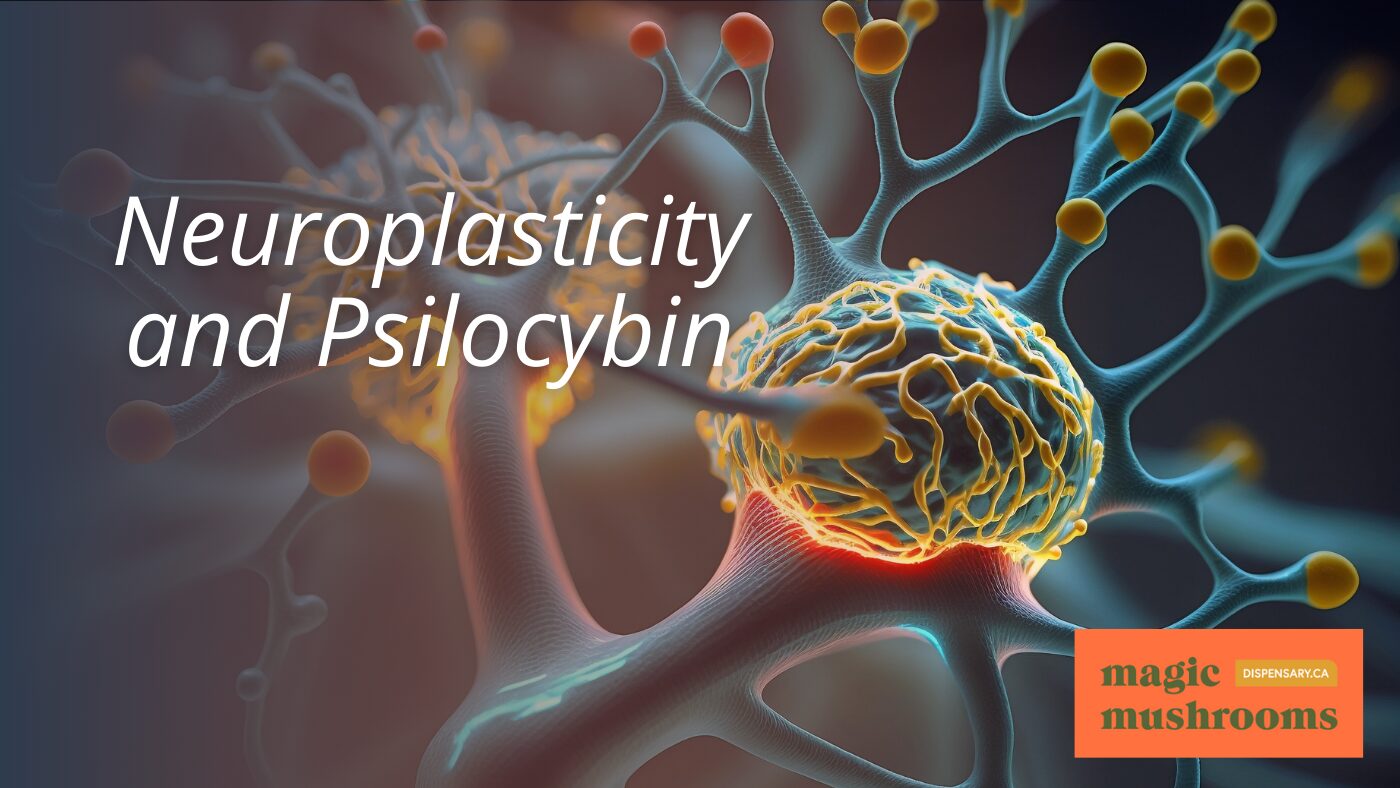
Exploring the role of psilocybin in promoting neuroplasticity reveals its profound potential in reshaping neural pathways to support mental health recovery. Psilocybin, a naturally occurring psychedelic compound found in certain species of mushrooms, has shown significant promise in facilitating neuroplastic changes within the brain. These changes are vital for the treatment of various psychiatric conditions, as they enable the brain to form new neural connections and reorganize existing ones.
Research indicates that psilocybin interacts with serotonin receptors in the brain, particularly the 5-HT2A receptor, which plays a pivotal role in the regulation of mood and cognition. This interaction leads to an increased release of neurotransmitters and neurotrophic factors that promote neuroplasticity. Consequently, individuals undergoing psilocybin therapy may experience a reduction in symptoms of depression, anxiety, and other mental health disorders due to the enhanced neural flexibility.
Further studies have demonstrated that the neuroplastic effects of psilocybin are not only significant but also enduring. Participants in psilocybin therapy sessions often report sustained improvements in mood and behavior, suggesting that the neuroplastic changes induced by psilocybin can lead to long-lasting positive outcomes. These findings underscore the potential of psilocybin as a transformative agent in mental health therapy, capable of helping individuals break free from entrenched negative thought patterns and behaviors.
Understanding and harnessing the neuroplastic capabilities of psilocybin could revolutionize the treatment landscape for mental health. As research progresses, it becomes increasingly clear that psilocybin’s ability to remodel neural pathways is central to its therapeutic effects, offering hope for more effective and sustainable mental health interventions.
Ethical Considerations in Treatment
Ethical considerations in magic mushroom therapy are pivotal, encompassing informed consent, confidentiality, and patient autonomy to uphold the protection and well-being of participants. Informed consent is particularly essential, as it involves guaranteeing that patients are fully aware of the potential risks and benefits involved in the therapy. This process must transparently communicate the experimental nature of using psilocybin and the possible experiences during the sessions, allowing individuals to make an educated decision about their participation.
Confidentiality must be strictly maintained to protect participants’ privacy. This involves safeguarding personal information and details of the therapy sessions, which is fundamental in building trust between the therapist and the patient. Additionally, respecting patient autonomy is crucial, allowing individuals the freedom to make decisions about their treatment based on their values and beliefs without coercion.
The responsibility of maintaining these ethical standards lies heavily on the shoulders of the therapists and the institutions they represent. They must adhere to rigorous ethical guidelines designed to protect participants and ensure that the therapy delivers benefits without causing harm. This includes respecting cultural beliefs and individual diversity, which are critical in tailoring treatments to meet the specific needs of each patient.
Moreover, continuous evaluation and adherence to these ethical principles are essential for the responsible use of magic mushroom therapy. This ongoing process ensures that the therapy remains a safe and effective option for patients, promoting their overall well-being while respecting their dignity and rights.
Training for Therapists
Therapists seeking to administer magic mushroom therapy must undergo specialized training to effectively guide and support their clients through the psychedelic experience. This training is vital in guaranteeing that therapists are equipped with the necessary skills and knowledge to create a therapeutic setting that maximizes the benefits of psilocybin and minimizes potential risks. Training programs typically include detailed modules on the pharmacology of psilocybin, the expected psychological impacts, and the nuances of facilitating a session where clients may encounter intense emotional and sensory experiences.
In these programs, therapists learn how to establish and maintain a safe and supportive environment, essential for clients as they navigate potentially transformative experiences. The training emphasizes the importance of empathy, patience, and professionalism in handling the various responses individuals may have to psychedelic substances. Techniques for helping clients integrate their psychedelic experiences into their everyday lives are also a fundamental component of the curriculum, ensuring that the benefits of the therapy extend beyond the initial sessions.
Additionally, therapists are trained to recognize and manage any challenges that arise during sessions, such as anxiety or distress. This preparation includes strategies for guiding conversations and activities that help clients process their experiences in a constructive manner.
Ongoing supervision and continuing education are mandatory aspects of a therapist’s professional development in this field. These elements make sure that therapists remain updated on the latest research, refine their skills, and adhere to best practices, thereby safeguarding client safety and enhancing the therapeutic outcomes of magic mushroom therapy.
Regulatory Challenges and Considerations
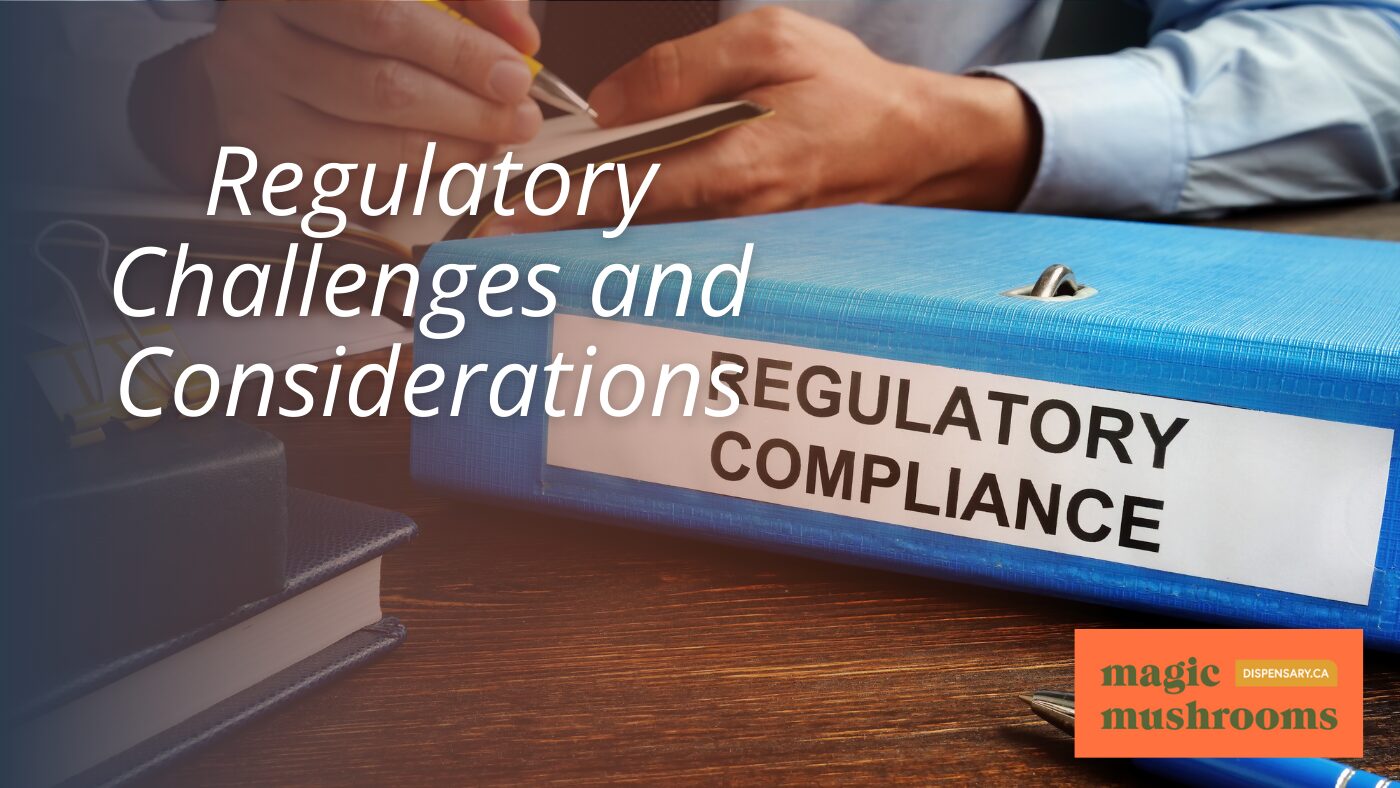
Despite ongoing legalization efforts in several states, psilocybin’s classification as a Schedule I drug presents significant regulatory challenges to its research and clinical application. This classification, reserved for substances deemed to have no currently accepted medical use and a high potential for abuse, severely restricts scientific access and funding for research into psilocybin’s therapeutic potentials. It also complicates the legal landscape for healthcare professionals interested in integrating this substance into treatment protocols, requiring them to navigate a labyrinth of federal and state regulations.
As states like Colorado and Oregon take steps towards legalization, they not only challenge federal policy but also create a patchwork of laws that researchers and practitioners must consider. This inconsistency can hinder the development of standardized treatment methodologies and complicate multi-state studies, which are critical for advancing the understanding of psilocybin’s effects across diverse populations.
Moreover, federal regulations impact the training and licensing of therapists who might use psilocybin. Without federal approval, these professionals risk their licenses when engaging in or advocating for psilocybin therapies. This creates a significant barrier to entry for potential therapists and limits patient access to qualified practitioners.
Addressing these regulatory hurdles is essential for moving forward. It involves not only continued advocacy for reclassification at the federal level but also a concerted effort to educate lawmakers and the public about the therapeutic benefits evidenced in scientific research. Effective change will likely require a combination of legislative adjustments, increased public awareness, and robust academic inquiry to align federal and state laws with the emerging data on psilocybin therapy.
Future Research Directions
Exploring future research directions, studies on magic mushroom therapy are expanding to investigate its efficacy across a broader spectrum of psychiatric disorders. While initial studies have largely focused on depression and anxiety, emerging research aims to understand the potential benefits in treating conditions such as obsessive-compulsive disorder, post-traumatic stress disorder, and even eating disorders. This broadening of scope underscores the necessity for diverse clinical trials that incorporate various demographic groups to guarantee the findings are universally applicable and beneficial.
Additionally, there is a concerted effort to pinpoint the most effective dosing regimens and treatment protocols. Determining the best dosage that maximizes therapeutic outcomes while minimizing side effects is essential. This involves rigorous testing phases that not only look at short-term impacts but also long-term effects on mental health. The safety profile of psilocybin is a primary concern, guiding researchers to conduct extensive evaluations that monitor participants over extended periods.
The development of novel delivery methods and formulations is also a key area of focus. Researchers are exploring different administration routes, such as nasal sprays or transdermal patches, which might offer more controlled dosing and potentially better patient adherence compared to traditional methods. Such innovations could revolutionize the way psychedelic therapy is administered, making it more accessible and less intimidating for patients.
Collaborative efforts are underway to establish standardized guidelines and protocols. These collective endeavors by the scientific and medical communities aim to integrate magic mushroom therapy into mainstream healthcare, ensuring it is delivered safely and effectively across various settings. These guidelines will likely influence future regulatory frameworks and help in scaling the use of this therapy globally.
Combining Therapy With Medication
Combining psilocybin medication with traditional therapy can greatly enhance the effectiveness of treatments for various psychological conditions. This integrated approach leverages the unique properties of psilocybin to facilitate deeper therapeutic engagements and promote significant psychological breakthroughs. During therapy sessions, clients are guided through their psychedelic experiences by trained therapists, who help them navigate the emotional and cognitive revelations that arise. This essential setting is paramount for ensuring that clients can safely explore and address deep-seated psychological issues.
The synergy between psilocybin medication and psychological therapy fosters a conducive environment for emotional healing and cognitive restructuring. Therapy sessions are tailored to help individuals process the profound insights and altered perspectives gained during their psilocybin experiences. This critical process is necessary for integrating these insights into practical, everyday applications, leading to enduring behavioral and mental health improvements.
Moreover, the combination of psilocybin and therapy targets the root causes of mental disorders rather than merely alleviating symptoms. By addressing these underlying issues, the integrated treatment model aims to provide a more holistic and sustainable solution to mental health challenges. Patients often report a greater sense of clarity, improved emotional resilience, and a renewed ability to engage positively with life after undergoing combined psilotherapy.
Patient Eligibility Criteria
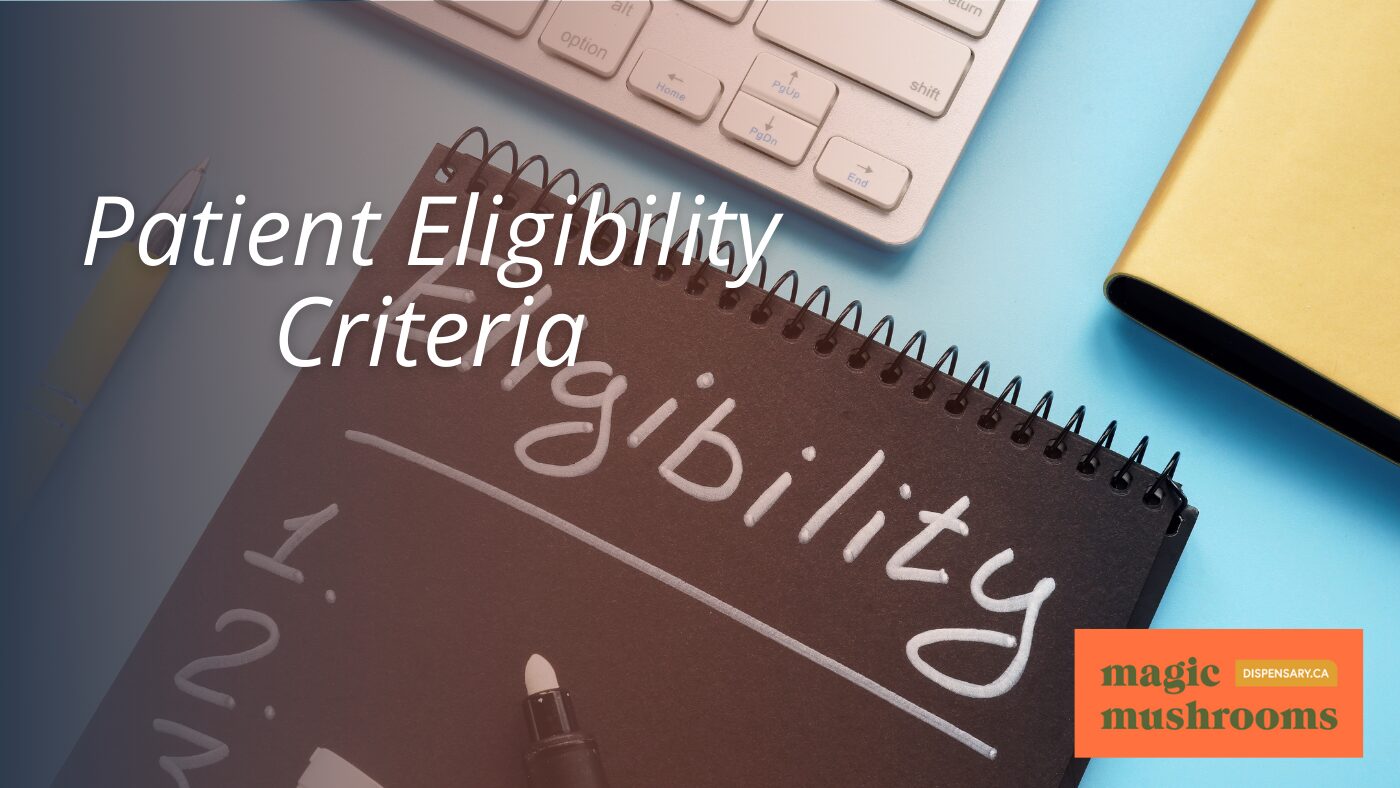
To qualify for magic mushroom therapy, patients must meet specific criteria, primarily focusing on those with treatment-resistant depression or anxiety disorders. These individuals often have a history of trying various conventional treatments, such as medications and psychotherapy, without sufficient improvement in their mental health. The selection process for this form of therapy is strict due to the potent nature of psychedelic compounds involved and the profound psychological experiences they induce.
Candidates for magic mushroom therapy are typically screened thoroughly to make certain they are mentally stable enough to handle the intense experiences associated with psychedelic treatment. This screening includes a detailed psychiatric evaluation to rule out any conditions that might be exacerbated by the use of psychedelics, such as schizophrenia or bipolar disorder. It is essential that patients have a stable mental state to minimize the risk of adverse reactions during the therapy session.
Furthermore, patients must demonstrate a clear understanding of what the therapy entails and the potential emotional and psychological impacts. Informed consent is a vital component, ensuring that patients are fully aware of the benefits and risks associated with magic mushroom therapy. They must also commit to participating in follow-up care and integration therapy to help them process their experiences and solidify any insights gained during the sessions.
Safety Protocols in Magic Mushroom Therapy
Safety protocols in magic mushroom therapy are meticulously designed to safeguard participants from potential risks associated with psychedelic experiences. Key among these protocols is the rigorous screening process for participants. This initial step ensures that only individuals who are mentally and physically suitable undergo the therapy, thereby reducing the risk of adverse psychological reactions. In addition to the screening, trained therapists are present during sessions to provide necessary supervision and support. Their role is pivotal in guiding participants through the emotional and perceptual changes that occur during the experience, ensuring safety and comfort.
Moreover, dosage control is a critical component of these safety protocols. Precise dosages are determined based on individual factors such as body weight, mental health history, and previous experiences with psychedelics. This tailored approach helps in minimizing the risk of overwhelming experiences and potential side effects, fostering a therapeutic environment that is both controlled and predictable.
Post-therapy integration sessions constitute another essential aspect of the safety framework. These sessions are designed to help participants process their experiences, derive meaningful insights, and integrate these into their daily lives. This step is necessary for the therapeutic benefits to be sustained and for preventing any residual psychological disturbances.
Furthermore, the adherence to ethical guidelines and legal regulations ensures that all practices within magic mushroom therapy are conducted responsibly. It maintains the integrity of the therapeutic process and protects the welfare of all participants, emphasizing a commitment to professional standards and patient safety.
Public Perception and Stigma
Public perception of magic mushroom therapy has evolved dramatically, aided by compelling research and increased educational efforts that highlight its therapeutic potential. Previously mired in controversy and associated with recreational misuse, magic mushrooms are undergoing a reputational transformation, becoming more accepted within medical and psychological communities. This shift is largely driven by a growing body of evidence indicating their efficacy in treating various mental health disorders, such as depression and PTSD.
The stigma that once surrounded magic mushrooms is gradually diminishing. As scientific studies continue to validate their therapeutic benefits, public attitudes are changing. Media coverage has played a significant role in this evolution, often highlighting personal success stories and scientific breakthroughs. These narratives are critical in humanizing the therapy, allowing individuals to see beyond the drug’s psychedelic reputation to its potential as a healing tool.
Moreover, educational campaigns and awareness initiatives are vital in reshaping the public’s understanding. By disseminating information about the controlled, professional environments in which these therapies take place, these efforts help differentiate therapeutic use from recreational use. They also address common misconceptions, such as the inevitability of severe hallucinations, clarifying that the therapeutic use of magic mushrooms can be carefully managed to minimize such effects.
This progress in public perception is essential for the future of magic mushroom therapy. As stigma fades and knowledge spreads, more individuals may seek out this form of treatment, encouraged by its legitimacy and the growing acknowledgment of its benefits in the scientific and medical communities.
The Future of Psychedelic Medicine
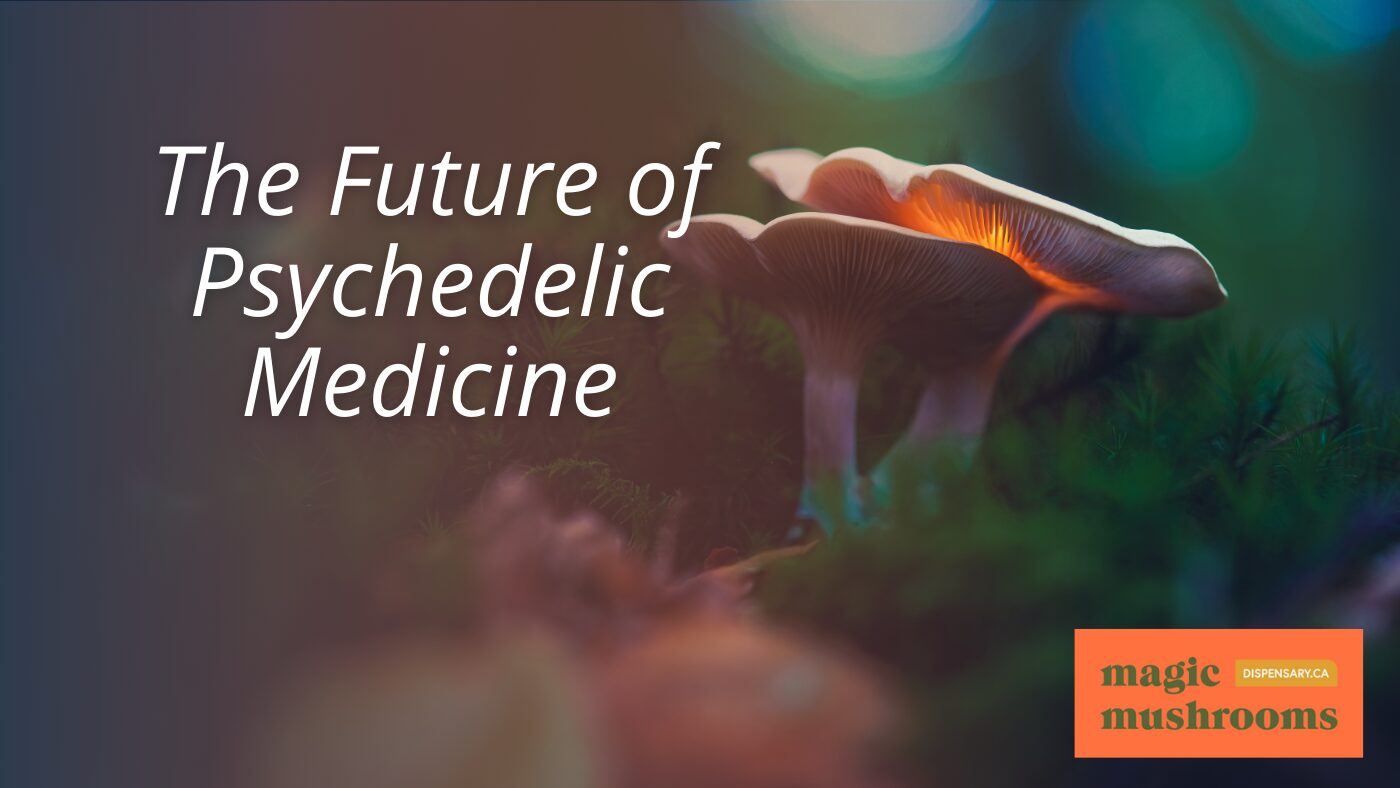
The future of psychedelic medicine, particularly psilocybin therapy, is poised for significant advancement as more rigorous clinical trials and regulatory considerations come into play. With over 130 active clinical trials investigating the therapeutic benefits of psilocybin, there is an unmistakable surge in interest and optimism within the scientific community. These studies are pivotal in understanding psilocybin’s efficacy across various mental health disorders, including depression, anxiety, and addiction.
COMPASS Pathways, a notable player in this field, is working towards FDA approval of psilocybin therapy by 2025. This move underscores a broader shift towards mainstream acceptance and could potentially open doors for more widespread use of psychedelic therapies. The clinical trials conducted by COMPASS and others are critical in shaping a regulatory framework that guarantees patient safety while harnessing the therapeutic potentials of psilocybin.
Research has consistently shown that psilocybin provides rapid and substantial antidepressant effects, with benefits lasting up to 6-12 months after treatment. This promising outcome points to psilocybin’s capacity to effect lasting change in the brain’s structure and function, particularly in the prefrontal cortex, through enhanced neural plasticity and synapse formation.
However, the journey ahead requires careful navigation. The expansion of clinical trials to include larger participant groups will provide more robust data, helping to fine-tune treatment protocols and better understand the mechanisms at play. As the scientific community continues to explore and validate the clinical applications of psilocybin, the future of psychedelic medicine looks promising, potentially revolutionizing the way we approach mental health treatment.
Frequently Asked Questions
How Does Psychedelic Therapy Work?
Psychedelic therapy, like planting seeds in fertile soil, promotes profound mental growth by activating serotonin receptors in the brain. This activation results in altered perceptions and heightened neural plasticity, enabling the formation of new neural connections. Targeting these pathways, the therapy facilitates deep introspective experiences and emotional catharsis, contributing greatly to psychological healing and resilience. It’s an innovative approach, enhancing traditional therapies by reshaping cognitive and emotional frameworks.
What Is the Mushroom Study?
The mushroom study refers to research focusing on the effects of psilocybin, a psychoactive compound found in certain mushrooms, on various mental health disorders. This scientific investigation examines how psilocybin can alter brain function, potentially improving symptoms of depression, anxiety, and addiction. The study aims to evaluate both the efficacy and safety of psilocybin in therapeutic settings, contributing to a deeper understanding of its mechanisms and potential benefits in mental health treatment.
What Is the Mushroom Treatment Psychology?
Mushroom treatment psychology explores the mind’s labyrinth, utilizing psilocybin’s key to access profound emotional and cognitive landscapes. This therapeutic approach leverages the psychedelic properties of magic mushrooms to initiate significant psychological shifts and promote mental healing. By facilitating altered states of consciousness, it assists individuals in addressing deep-seated issues, leading to potential breakthroughs in treating conditions such as depression, anxiety, and PTSD under controlled, clinical settings.
How Do Psychedelics Treat Ptsd?
Psychedelics, such as psilocybin, treat PTSD by facilitating profound psychological experiences that can alter perception and emotional responses. These substances interact with serotonin receptors, potentially leading to reduced symptoms and improved mood. The treatment often enables individuals to reprocess traumatic memories within a controlled therapeutic setting, promoting emotional release and cognitive restructuring. This can result in decreased PTSD symptoms and improved overall mental health.
Conclusion
To wrap up, the therapeutic potential of psilocybin, the active compound in magic mushrooms, is evidenced by a study showing a 60% reduction in depression symptoms among participants post-therapy. As research advances, the development of robust safety protocols and clear patient eligibility criteria will be pivotal. The future of psychedelic medicine appears promising, potentially revolutionizing the treatment landscape for numerous psychological disorders, provided that societal perceptions evolve alongside scientific understanding.
Buying Microdosing Mushrooms Online in Canada
Are you an avid microdoser or looking to venture into the art of microdosing? Working with a reliable, trustworthy shrooms dispensary is paramount in becoming a better version of yourself. Magic Mushroom Dispensary prides itself on its comprehensive collection of top-notch microdosing products, psilocybin books, excellent customer service, and fast, discreet shipping. Visit our online shop today and enjoy low prices and free shipping for orders above $99.
Originally posted on June 30, 2024 @ 9:55 am
